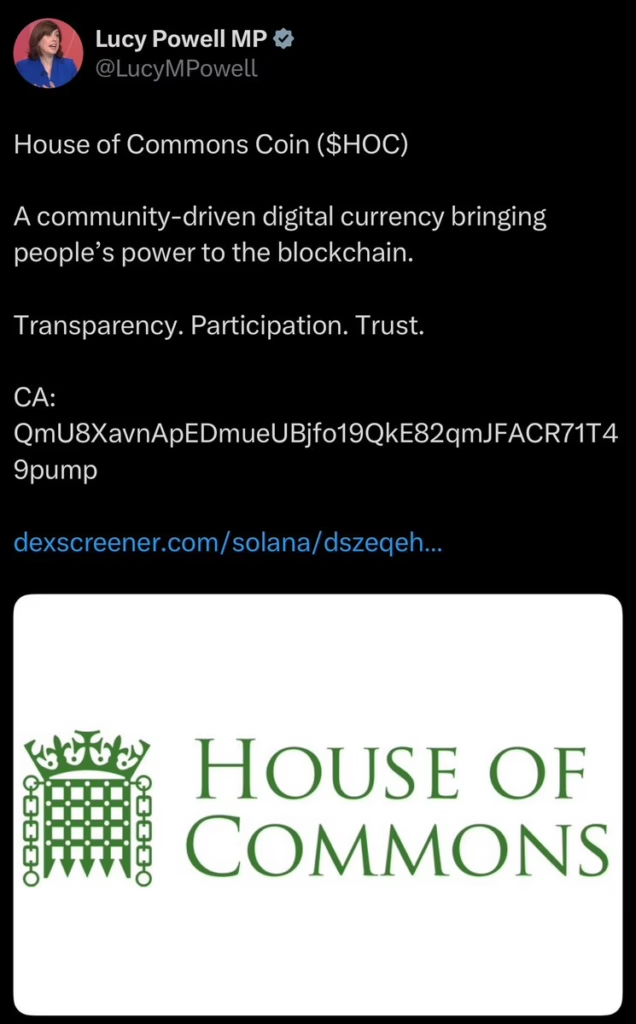Hack Targets House Leader Lucy Powell to Lend Legitimacy to Meme Coin
The X (formerly Twitter) account of Lucy Powell, the UK Member of Parliament and Leader of the House of Commons, was compromised on April 15 to promote a fraudulent cryptocurrency project called House of Commons Coin (HOC).
The hack led to a flurry of now-deleted posts falsely portraying HOC as a “community-driven digital currency.” Links to trading platforms were also shared in an attempt to attract investors, leveraging Powell’s official political profile to boost credibility.
A member of Powell’s staff confirmed to the BBC that the account was hacked and said,
“Steps were taken quickly to secure the account and remove misleading posts.”
A Scam with Minimal Impact — But a Growing Trend
According to data from DEX Screener, the HOC token generated only limited activity, reaching a peak market cap of just over $24,000. The token has since recorded only 736 transactions and $71,000 in trading volume, suggesting the hack failed to generate any serious traction among investors.
Despite the low impact, the incident highlights a growing trend of political impersonation and account breaches being used to promote scam crypto tokens.
While Powell herself has no prior association with cryptocurrency, her high-profile position made her account a prime target for scammers hoping to lend an air of legitimacy to their operation.
Political Crypto Endorsements: From the Real to the Ridiculous
The abuse of political figures for crypto promotion isn’t always fraudulent. Some leaders have willingly entered the crypto space, sometimes with controversial results.
-
Donald Trump and Melania Trump launched and promoted memecoins shortly before entering the White House.
-
Argentine President Javier Milei endorsed a token called LIBRA, which rapidly crashed in value and led to calls for investigation into his role.
These examples blur the line between legitimate crypto engagement and dubious financial exploitation of public influence, making it harder for the public to distinguish between real projects and scams.
Similar Hacks: Ghana’s President Also Targeted
Powell’s case follows a similar hack in March 2025, when the X account of Ghanaian President John Mahama was hijacked for 48 hours to promote a fake project named Solanafrica.
The scammers falsely claimed support from Solana and the Bank of Ghana, pushing the idea of a cross-continental crypto payments system. Mahama’s team regained control of the account two days later and urged followers to ignore any crypto-related content posted during the breach.
“The account has now been fully restored,” said Mahama’s spokesman, Kwakye Ofosu.
“We urge the public to disregard any suspicious cryptocurrency-related posts from the handle.”
⚠️ SCAM ALERT: The X account of Ghana’s President, @JDMahama, has been compromised and is posting a crypto scam.
Solanafrica claims to be “a project led by Ghana’s president John Mahama to make payments across Africa free using the Solana blockchain.” pic.twitter.com/PZ2cxNYENo
— CediRates (@CediRates) March 16, 2025
Final Thoughts: When Politics and Crypto Collide, Caution Is Critical
The hacking of Lucy Powell’s account is part of a larger pattern in which cybercriminals exploit public figures’ social media reach to shill fraudulent digital assets.
While the financial damage from this specific incident was minimal, the implications are troubling. These tactics erode public trust, spread misinformation, and create confusion between legitimate innovation and deception.
As the crypto space matures, both regulatory bodies and social platforms will need to respond more aggressively to prevent the exploitation of political figures for scams—and public users must remain vigilant. If a token is launched under the name of a government body, always double-check before you invest.













